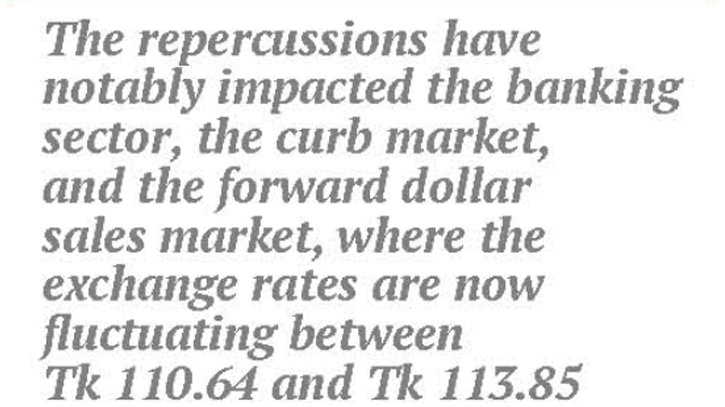
Photo : TDM
In the backdrop of a burgeoning dollar crisis, multiple facets of the financial landscape in the country are feeling the reverberations. The repercussions have notably impacted the banking sector, the curb market, and the forward dollar sales market, where the exchange rates are now fluctuating between Tk 110.64 and Tk 113.85.
It's worth noting that certain allegations have arisen, accusing some banks of selling dollars at an even higher rate of Tk 114. These transactions are primarily connected to the prepayment of commercial import debts and foreign loans, reflecting the critical role of the forward dollar market in current financial operations.
Presently, the acquisition of dollars in advance has primarily been channeled towards financing imports of commercial goods, industrial raw materials, and machinery. This trend reflects the paramount importance of securing dollars for settling import-related obligations. However, this high demand, coupled with escalating import costs, has inevitably translated into soaring prices for imported goods, thereby exerting upward pressure on inflationary trends.
Traders have voiced their concerns, highlighting the challenge of securing dollars at even the fixed maximum rate of Tk 110 within the banking system. The scarcity of dollars within the interbank market has led many businesses to resort to purchasing dollars in advance for periods ranging from one month to a year, albeit at significantly higher prices.
It is known that in August, a one-month forward dollar was sold at the rate of Tk 110.14. It has increased by Tk 0.50 and is now selling at Tk 110.64. The two-month dollar was selling at Tk 110.78 in August; it is now selling at Tk 111.28. The three-month dollar was selling at Tk 111.42 in August; it is now selling at Tk 111.93, up by 0.51 taka.
Besides, the six-month forward dollar was selling at Tk 113.34 in August. It increased by Tk 0.51 and is now selling at Tk 113.85. And a one-year term forward dollar is being sold at the highest price of Tk 114.
This surge in forward dollar market rates has been noticeable since early September, with experts suggesting that these rates may persist into the coming month. The situation appears precarious, with the potential for further increases in forward market rates should the dollar's price continue to climb at the onset of October.
It's important to note that while the central bank, through entities like BAFEDA and ABB, exercises control over the primary dollar market, it does not regulate the forward dollar market. In the latter, banks independently set rates based on supply and demand dynamics. This relative autonomy enables banks to sell dollars in the forward market at prices up to Tk 4 higher than prevailing market rates.
Banks typically engage in advance dollar sales as part of their strategies for repaying LC (Letter of Credit) debts and foreign loans, as LCs are now contingent on access to dollar resources. This heightened demand for forward dollars has inevitably driven up their prices, given the scarcity in the market.
In this regard, a director of FBCCI and a businessman told The Daily Messenger on the condition of anonymity that while exporters can utilise their own dollar reserves for LCs, importers often rely on banks for dollar resources. This reliance on banks for opening LCs has spurred an uptick in demand for forward dollars, consequently driving prices higher.
Since August 3, the new higher dollar rate has been in effect, capping the import price per dollar at a maximum of Tk 110. However, within a mere two days, the rate surged to its peak at Tk 110, highlighting the persistent challenge of securing dollars at this rate.
Although banks could, in theory, sell surplus dollars in the interbank foreign exchange market, they are opting for the more lucrative forward market, where they can fetch higher prices, particularly as they grapple with narrowing profit margins. Export bills and remittances are now being acquired at Tk 109.50 and sold at Tk 110, yielding a slim profit of Tk 0.50 per dollar after factoring in operational costs.
This scenario has led banks with excess dollars to turn to the forward market, where they can sell at substantially higher rates. Furthermore, the gradual increment of Tk 0.50 to Tk 1 in the dollar's price each month is pushing the forward dollar rates upward.
In line with directives from the central bank, exporters with back-to-back LCs and outstanding dollar liabilities exceeding 30 days must utilise those dollars within that timeframe. After this period, banks are allowed to convert these dollars for alternative purposes, eliminating the option of holding dollars for extended durations.
An anonymous managing director of a private bank emphasised that private sector importers are currently grappling with difficulties in securing dollars, resorting to advance booking for essential imports with durations spanning from one to six months or even a year. Importantly, these forward dollar transactions require upfront payment, and in cases where the future rate exceeds the forward rate at the time of supply, additional payments are mandated.
The intricate dynamics of the dollar crisis are reshaping the financial landscape in Bangladesh, and stakeholders are grappling with the multifaceted challenges that arise from these shifts.
TDM/SD








